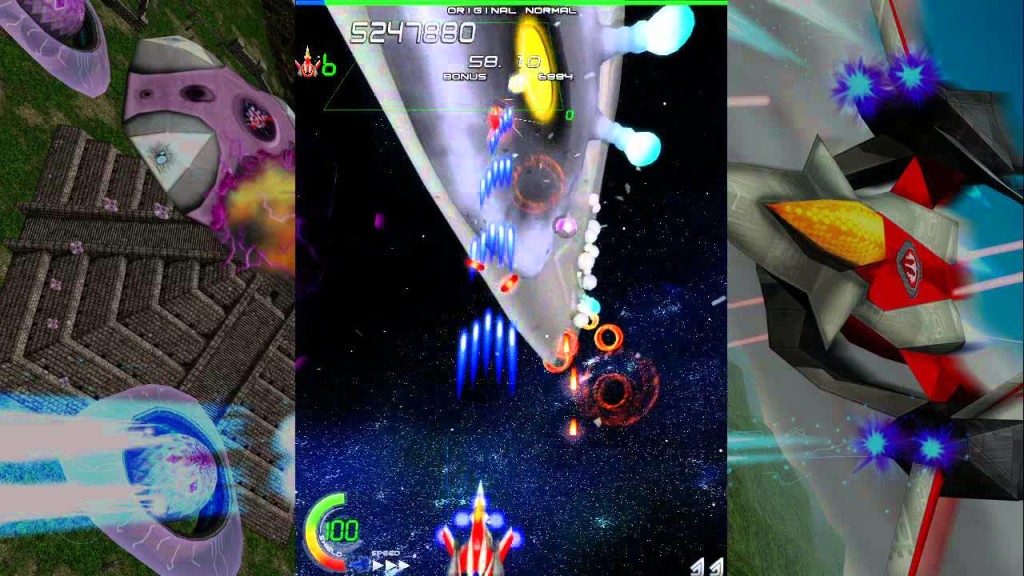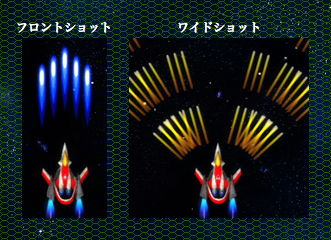14 “You are the light of the world. A city set on a hill cannot be hidden; 15 nor does anyone light a lamp and put it under a [g]basket, but on the lampstand, and it gives light to all who are in the house. 16 Let your light shine before men in such a way that they may see your good works, and glorify your Father who is in heaven.
Matthew 5
Consider this my “lamp not being hidden under a bushel” moment…also, this is a dumb Christian joke, and you should ignore it…
Eschatos is quite the game, let me tell you!
As I recently delved into the realm of the shooting game once again, I’ve found an unbelievable variety of choices. None of them resonate at first glance, however. While I enjoy the bullet hell shenanigans of CAVE in games like DoDonPachi: DaiOuJou and appreciate (from afar…) the rank-based madness of Raizing, both companies of which the experts sing praise, I’m not exactly sure what kind of shmups I actually enjoy the most. Considering how many games keep popping up for a small fan base’s consumption, that’s a difficult task. Add MAME to the mix, and that task turns into a near impossibility. You gotta try them all, at least once!
So do we arrive at Eschatos. The spiritual successor to a Wonderswan game absolutely no one played (Judgment Silversword), Eschatos demonstrates Qute’s ability to condense a ton of genre tropes into one game. The designer and main (if not only) developer, M-KAI (don’t ask me about these names), seems to enjoy a host of different games, and that shines through in Eschatos‘ level design. You’ve got direct homages to Space Invaders, liberal use of insane bullet patterns, a dynamic 3D camera that (somehow) keeps the game playable and exciting, along with level design that speaks of many hours determining just the right enemy layouts and pacing. From my perspective, Eschatos often feels like a 10-hour action game rolled into 30 minutes! That’s partly credit to the amazing soundtrack by Yousuke Yasui, which manages to emphasize the increasing intensity of the game while allowing for space to breathe – quiet time, as it were, in a shmup. I think pacing might be Eschatos‘ greatest attribute – no other game in this genre nails so many ineffable elements in the same way, and while difficult to describe, anyone who’s spent time with M-KAI’s project knows exactly what I mean.

That said, the game design remains paramount here; you’re never NOT in control of the exciting action, and that’s where Eschatos stays close to its inspirations. There’s nothing excessively complicated about Eschatos‘ controls, either. You have three different weapons to choose from: a straight shot, a wide shot (which fires at two different angles – very important!) and a frontal shield. None of them can be used simultaneously, so you need to choose the right one for the situation. The straight shot does the most damage, but also the smallest firing arc; the wide shot covers a wide range, but also does not do much damage. You never lose firing power from player deaths, so have at it!
The shield, however, remains your vital lifeline. For those spreads which look impossible, activate the shield by holding the other two shot buttons together. The shield absorbs bullets after a little time, depending on the strength of the shot, and that will save you often! The shield only stays up for a limited time, since it’s beholden to a charge meter (located in the bottom right-hand corner of the screen). Lastly, that shield also acts as an offensive weapon, on par with the straight shot, so some survival strategies can involve deft use of shields to kills enemies as fast as possible. The shield lets you improvise far more than most shmups, eschewing memorization unless you want to score highly by killing things quickly.

And, killing enemies as fast as possible remains your goal in nearly every single segment and level of Eschatos. Far as I can tell, the game encourages you to kill every enemy in every wave. Each time you do this, the score multiplier rises by 1; miss, and the multiplier drops. While “kill all the things” sounds like a simple task, anyone who plays these games knows that it isn’t easy. Once foes start hurling (in the heaving sense) tons of brightly colored projectiles at your tiny ship, you’ll find that a difficult prospect! It will take many plays before you wrap your head around the time-limited intensity of scoring, but trust me, it’ll make sense! In some sense, the scoring might be a bit too punishing to minor mistakes, but I think the system makes up for that with its ease of understanding. Compare that to most modern games in the genre, and Eschatos looks like a bastion of simple, nuanced design amid chains and chips and whatever other crazy scoring mechanics developers like to throw into their games.
So, all in all, just from playing Original Easy, I’ve got a good sense of Eschatos‘ positive attributes. What saddens me is that, considering the game’s quality, I’ve yet to find any reviews of the game upon its Steam release from major websites. The closest I could find came from Hardcore Gamer, while the rest came from enthusiast sites all over the place. That a genre could fall so far out of the mainstream, especially one so accessible as Eschatos, saddens me a whole lot. I didn’t even bother requesting a review copy, mostly because I felt the need to actually support the people who made this game (and published it, go Degica!). There’s something fundamentally wrong when games like this can get lost in the never-ending Steam shuffle of new releases. I rarely review things I did not yet finish (I stumbled a stage or two before the final boss), but in this case I’ll make an exception!
Sometimes, you just need to shamelessly support something you love, and in this case Eschatos has captivate me even under the weight of Metal Gear Solid V: The Phantom Pain. It is the “ultimate” in a sense, able to deftly combine lots of games while being its own unique journey to SHOOT THE CORE. Eschatos is definitely worth your time!
